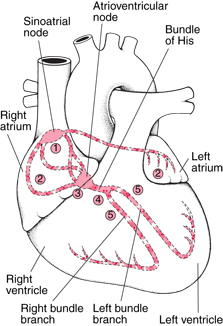
Most people with a bundle branch block require only mild treatment and do not require extensive treatment. But if you have cardiovascular disease causing a bundle of His, treatment may include medication to reduce symptoms of heart failure or lower blood pressure. Your doctor will first assess if your heart can function properly.
The most common cause of bundle branch block is ruptured heart valve. The most common hernia is, although any damage to the inner lining of the heart muscle can cause a bundle of His to be blocked. Most often, hernias are caused by blockages in a small opening in the valve, known as an inversion defect. The valve can become stuck inside the walls of the heart chamber, causing blockage.
If this happens frequently in your heart, it may be torn. The good news is that the symptoms of this condition usually go away within a few days or weeks. However, you may experience chest pain, dizziness, difficulty breathing, or even chest pain or pressure in your neck or jaw. If you notice any of these symptoms, see your doctor immediately.
Ligamentous blockages are more common in people with a history of heart disease. These include people with congenital heart defects, hypercholesterolemia (high cholesterol), congestive heart failure, and smokers. Although these people may not have a history of heart disease, they are still at risk of developing it as they age.
While there is no evidence that smoking causes a bundle of His, it may increase the likelihood of developing it if a person is exposed to secondhand smoke. If you smoke, you should quit smoking to protect your heart.
Your doctor will ask you a few questions to help determine the cause of your heart block. He will want to know your general health, how long ago you had heart problems and what is your medical history. He will also look for symptoms you may have. If you smoke, he may want to know if you smoke or if you are in poor health. He will also want to know if you are taking any medications that may be causing you a blockage.
You may not be asked any questions during your visit with your physician. But it is important that you answer your questions honestly. If you are unable to provide accurate information, then you may not get the best results for your treatment. And if you do not have to ask questions, you can rest assured that your physician has the utmost confidence in the work you’ve done.
If you decide to go see your physician at the hospital or doctor’s office, you may also be asked some questions that are specific to your condition. He will perform the test on your heart and then explain the results to you. The tests that will be performed during your visit will include a blood test to check the levels of triglycerides, heart rate and cardiac output.
If you have a high triglyceride level, then the blood will show higher levels of bad cholesterol in your blood. If you have a high heart rate, then the blood will show higher levels of normal cholesterol.
If your heart does show a blockage, then the chest x-ray will show enlarged vessels that cause the symptoms of blockage. The doctor will discuss with you how best to treat this. He may decide to perform a heart valve or balloon angiectomy surgery to open the blocked artery and remove the blockage.
If you do decide to have surgery, your doctor may suggest some prescriptions to help you relieve the symptoms that you are experiencing. The most common prescription medications used include an aspirin or acetaminophen to reduce the inflammation of the artery walls. Also, you will probably be given prescription medication to dissolve the blockage or at least reduce the pain that you are experiencing.
If you are unable to visit your physician and receive a prescription for medication to alleviate the symptoms of your heart blockage, then you may wish to keep an eye on your heart while sleeping to ensure that it stays healthy. You may want to try to reduce your weight if you tend to overheat more often because excess heat can cause more blockage. If you find that the symptoms of your heart blockage are becoming worse, then you may want to speak with your doctor about other treatments for your condition.